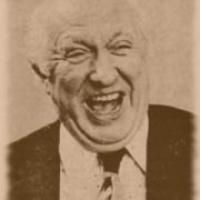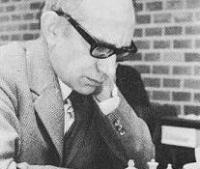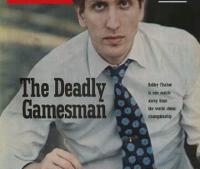
Don Miguel
Moishe Mieczslaw Najdorf was born near Warsaw Poland on April 15, 1910. He was a pupil of Savielly Tartakower. At the age of 20, he became a Polish National Master. He played for Poland in the 1935, 1937, and 1939 Chess Olympiads. At the Buenos Aires Olympiad in 1939 when World War II broke out, he decided not to attempt to return home, taking Argentine citizenship (1944) and changing his first name to Miguel. His family died in German concentration camps.
In 1943, he set the record for simultaneous games played. He played 202 players (+182-8=12). In 1947, he conducted a simultaneous exhibition in which he played a record 45 games blindfolded (+39 -2 =4). In 1972, he recalled in an interview: "I hoped that this exhibition would be reported throughout Germany, Poland and Russia and that some of my family might read about it and get in touch with me.'' But none did so.
In 1942, he won at Mar del Plata, with 13.5/17; in 1943, he was second at Mar del Plata, behind Stahlberg, scoring 10/13. In 1943, he won at Rosario. In 1944, he won at La Plata, with 13/16, In 1944, he tied for first with Herman Pilnik at Mar del Plata, with each scoring 12/15. In 1945, he won at Buenos Aires (Roberto Grau Memorial), with 10/12. He took second place at Viña del Mar 1945, with 10.5/13, behind Guimard, then won Mar del Plata 1945 with 11/15, and repeated at Mar del Plata 1946 with 16/18. That year he also won at Rio de Janeiro, and at Prague, with (+9 -1 =3), ahead of Petar Trifunović, Gosta Stoltz, Svetozar Gligorić, and Jan Foltys. He also won at Barcelona 1946, with 11.5/13, in 1948, placed second at New York with 6/9, behind Reuben Fine, won at Mar del Plata 1948 with 14/17, won at Venice 1948, with 11.5/13. According to Chessmetrics, he was ranked second in the world from mid-1947 to mid-1949. Despite his strong results, Najdorf was not invited to the 1948 World Championship tournament as a replacement for Reuben Fine.
Although not a full-time chess professional (for many years he worked in the insurance business), he was one of the world’s leading chess players in the 1950s and 1960s. In 1950 he played at Budapest in the Candidates Tournament to select a challenger for the world chess championship, and finished fifth. Three years later, in the Zürich Candidates Tournament in 1953, he finished sixth.
Najdorf maintained his strength for many years. He won important tournaments such as Mar del Plata (1961) and Havana (1962 and 1964). He also played in both Piatigorsky Cup tournaments, held in 1963 and 1966. Just before his 60th birthday, he participated in the 1970 USSR vs. Rest of the World match, achieving an even score against the former world champion Mikhail Tal. Najdorf remained active in chess to the end of his life. At age 69, he tied for second place in a very strong field at Buenos Aires 1979, behind Bent Larsen, though ahead of former world champions Tigran Petrosian and Boris Spassky. Check out the following combination he found at 86, one year before his death:
The Najdorf Variation in the Sicilian Defense, one of the most popular openings in modern chess, is named after him. Najdorf also made contributions to the theory and practice of other openings such as the King's Indian Defense. Najdorf was also a well-respected chess journalist, who had a popular column in the Buenos Aires Clarín newspaper; I remember when I visited Argentina in 1995, I won a nice game against GM Quinteros with the King's Indian, and Don Miguel wrote the next day in the Clarín that the young Cuban must have had everything prepared. (I came up with it all over-the-board). No doubt that was a big motivation for me :).
He won 52 international tournaments, and the Argentine chess championship eight times.
Najdorf died on July 4, 1997 in Malaga Spain. He was 87 and a beloved figure in Buenos Aires.
In his notes to one of his early games, Najdorf expressed a thought that helps us to understand his creative method: "I followed the advice of my mentor Tartakower who taught me to play on the basis of common sense and general review, and not get carried away by excessive calculus of variations.”
.

